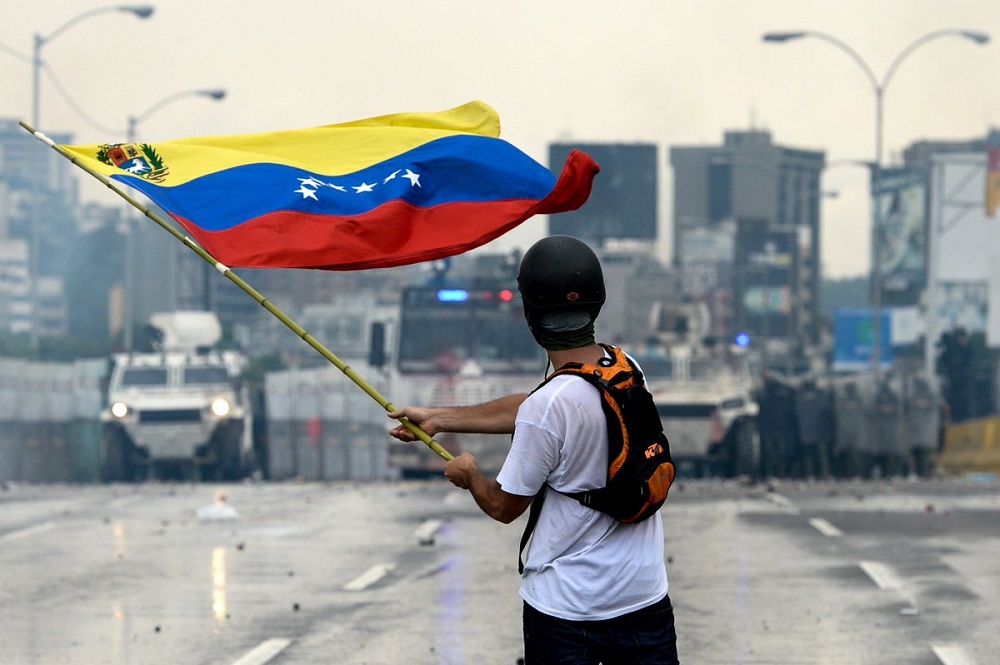US President Donald Trump warned on Monday that he may impose sanctions on Venezuela if its leader Nicolas Maduro went ahead with a plan to form a Constituent Assembly, as the opposition called for a nationwide strike for Thursday.
Trump threatened to take “strong and swift economic actions” if Venezuelan President Maduro goes ahead with the creation of the super-legislature in a July 30 vote.
“Yesterday, the Venezuelan people again made clear that they stand for democracy, freedom and rule of law. Yet their strong and courageous actions continue to be ignored by a bad leader who dreams of becoming a dictator,” Trump said in a statement issued by the White House.
“The United States will not stand by as Venezuela crumbles. If the Maduro regime imposes its Constituent Assembly on July 30, the United States will take strong and swift economic actions,” he said.
Maduro’s foes are demanding a presidential election and want to stop the leftist leader’s plan to create the Constituent Assembly, which would have the power to rewrite the constitution and annul the opposition-led legislature.
On Sunday, 98 percent of opposition supporters in an unofficial vote rejected the proposed assembly.
Maduro insists opposition leaders are US pawns intent on sabotaging the economy and bringing him down through violence as part of an international right-wing conspiracy led by Washington and fanned by private domestic and foreign media.
Senior White House officials told Reuters last month the Trump administration was considering sanctions on Venezuela’s vital energy sector, including state oil company PDVSA, a major escalation in US efforts to pressure the country’s government amid a crackdown on the opposition.
The idea of striking at the core of Venezuela’s economy, which relies on oil for some 95 percent of export revenues, has been discussed at high levels of the administration as part of a wide-ranging review of US options.
The White House officials, speaking on condition of anonymity, told Reuters the United States could hit PDVSA as part of a “sectoral” sanctions package that would take aim at the OPEC nation’s entire energy industry for the first time.
They made clear the administration was moving cautiously, mindful that if such an unprecedented step was taken, it could deepen the country’s economic and social crisis, in which millions suffer food shortages and soaring inflation.
Another complicating factor would be the potential impact on oil shipments to the United States, for which Venezuela is the third largest oil supplier after Canada and Saudi Arabia. It accounted for 8 percent of US oil imports in March, according to US government figures.
Earlier on Monday, the opposition called for a national shutdown against Maduro in a major escalation of protests against a leftist government it accuses of flouting the people’s will.
“We are not going to allow the destruction of Venezuela. The whole country overwhelmingly rejects the Maduro regime,” said opposition leader Freddy Guevara, announcing the first 24-hour strike in nearly four months of anti-government demonstrations that have led to some 100 deaths.
The opposition – which wants restaurants, shops and transport to come to a standstill on Thursday – said it would also take steps to set up a “national unity” government and name new alternative judges to the pro-Maduro Supreme Court.
That raised the possibility of a parallel state structure to challenge government-controlled institutions.
The opposition said it brought 7.6 million people out on Sunday for an unofficial vote intended to de-legitimize a man they call a dictator.
They are also seeking freedom for about 400 jailed activists, independence for the opposition-controlled legislature, and permission for foreign humanitarian aid to Venezuelans suffering shortages and hunger.
Guevara said the opposition would only talk with the government if the constituent plan was withdrawn. The hardball strategy recalls events before a short-lived coup against Maduro’s predecessor and mentor Hugo Chavez in 2002.
